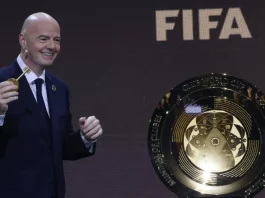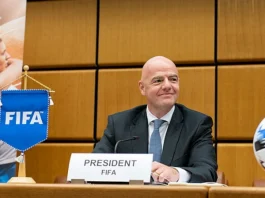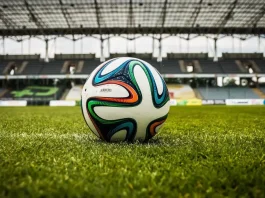The official stance of FIFA on the issue of political neutrality can be found in its statutes whereby the organization attempts to depoliticize the sport being identified purely with its administration and growth in the world. This motto has been repeated by president Gianni Infantino at major tournaments as well as during controversial geopolitical situations where Infantino has insisted that football should not be a political sphere.
In practice, however, public engagements of FIFA tend to muddy the waters it purports to be structured. Infantino has made close to 200 appearances alongside former U.S. President Donald Trump, who has become a prominent figure in politics again in a situation that prompts questions of selective visibility and political orientation. Trump has made policies in the past that are not welcoming to immigrants like tightening the possibility of immigration that lends to FIFA appearing as a globally inclusive entity. Critics mention the difference between the approach of Infantino to Trump, on the one hand, and co-host nations, Canada and Mexico, on the other, which is seen as a matter of currying favor with a powerful political personality instead of being balanced.
The Selectivity of “Neutrality” and Geopolitical Realities
FIFA seems to be lax in regard to its decision-making process when it comes to the host and tournament partnerships. The move by the organization to stage past and future events in countries like Qatar and Saudi Arabia, countries that have received severe critique internationally due to their labor conditions and civil rights violations, highlights its willingness to engage with partners that are economically strong despite being politically controversial.
In the meantime, FIFA has acted decisively against certain geopolitical players like the suspension of Russia in competitions due to invasion in Ukraine, yet it stays quiet on other subjects like the questionable status of Israel in the current tensions in the region. This inequality in practice and exposure is indicative of a select inequality in neutrality application, which is more reactive to diplomatic interests and projections of revenues than to a steady moral guide.
The Retreat from Anti-Discrimination Messaging and Social Responsibility
From Symbolic Leadership to Ambiguous Messaging
FIFA once established itself as a strong advocate of anti-racism and inclusion and introduced laudable symbolic gestures, like the call on saying no to racism, and allowing captains to carry armbands to support social causes. Precedents over the years have exhibited inclusive imagery and programming in particular with the Women World Cup with gender equality and recognition of the indigenous being a key subjective interaction.
By 2025, there is a change in the momentum. The message was simplified during the FIFA Club World Cup in the United States to the vaguely defined phrase, Football Unites the World, with less direct allusions to anti-discrimination, racial equality, or gender equality. Human Rights Watch and the Dignity 2026 Coalition, along with other civil society organizations and advocacy coalitions, described the move as regressive, which denies long-hard gains toward using football as an equity and justice vehicle.
Commercial and Political Calculations Underpinning the Shift
According to analysts, this rhetorical withdrawal appears to have been done to ensure FIFA does not attract controversy in politically divided communities. The 2025 Club World Cup was hosted in a U.S. that experienced rollbacks of the LGBTQ + rights legislation and discussions surrounding race and immigration toxicity. The use of ambiguous messages might also be an attempt by FIFA to not get into disputes with its sponsors or the government of host states, some of which also want to keep the branding neutral.
The plan further shows the increasing strain of FIFA in its two functions as both a multination sports organization and a multibillion company. Activist messaging runs the risk of jeopardizing commercial relationships and so FIFA has downplayed its social profile to maintain newly found diplomatic and financial stability.
Governance Deficits Undermining Credibility and Neutrality
Ethics Committee and Accountability Challenges
Beneath FIFA’s claims to neutrality lies a persistent governance gap. The FIFA Ethics Committee, which in theory safeguards integrity and holds officials accountable, has struggled with credibility. There are no or very few consequences when investigations happen in an internal atmosphere and there are very minimal protections of whistleblowers.
Multiple reports filed in the beginning of the year 2025 show that the same issues of managing internal conflict of interests and not enough transparency of disciplinary processes persist. With these concerns, the internal controls that FIFA has established have become refracted into an examination of how FIFA has adopted the need to appear neutral in its decision making and may have overlooked inherent stasis and resistance to addressing misconduct at higher levels.
The regulatory failings experienced by FIFA appear to make it challenging to state the case that the organization could be taken seriously as non-ideological or non-political. Neutrality is an empty notion in lieu of integrity that can be based on a justifiable principle.
Fans, Players, and Independent Voices Demand Greater Transparency
There is more and more pressure on the behavior of FIFA with voices within the football ecosystem. The unions of players have openly condemned the consultation process on the conditions of tournament play and human rights practices in host countries. Organizations have been raising boycotts and protests with the support of customer networks in Europe, North America, and Asia, in which they revel in the gap between how FIFA publicly markets itself and how it really operates.
Such groups have been keen in 2025 on better clarity on decision making decisions, accountability by the government to the citizens and channels open to civil society to take part in governance. There is an increased pressure to follow through on rhetoric, especially after fans have become politically aware and athletes noticed they can speak loudly on social justice issues.
Navigating a Complex Future: Sport as Soft Power and Statecraft
As the most-watched sport globally, football serves not just as entertainment but as a tool of diplomatic and economic power. FIFA’s tournaments provide host countries with global visibility, soft power capital, and foreign investment opportunities. This reality means FIFA can seldom remain truly neutral; it must navigate the demands of state partners, private sector backers, and local populations simultaneously.
As an example, the venue of the 2025 Club World Cup in a variety of states within the United States necessitated that FIFA had to be involved with municipal-, federal-, and corporate-level stakeholders which have individual politics and policy systems in place. These interests are challenging to balance without making any explicit political statements in the modern context where no action is seen as neutral.
The Imperative of Authentic Engagement and Transparent Leadership
FIFA will have to either evolve its understanding of what neutrality means to include accountability and not avoidance, and based on that decide what qualifies as neutral television. This makes genuine neutrality in a globalized, challenged planet a transparent stance to ethical quandaries and the application of similar standards across political lines of division.
Reforming internal governance and stakeholder consultation and the adoption of rights-based standards that will permit hosts to be punished would enable FIFA to retain its international appeal and acquire moral standing. Such reinvented neutrality that is pegged to fairness, and not silence, can enable FIFA to stand by the political onslaughts without loss of objectives to unite the world on the basis of football.
Even neutrality, as reflected in FIFA in 2025, tests the boundaries of apolitical staging amid the increases in geopolitical interests, social pressures and commercial interests. Although neutrality has been one of the guiding stories of the organization, its operations reveal a disjuncture between the rhetoric and reality of practices that fans, players, and observers are growing tired of ignoring. The global nature of the sport of soccer means not only having a presence, but also taking responsibility, and the role of the sport organization (FIFA), in the years to come may well depend on its ability to do both, not on the field, but across the complex landscape of international relations.




